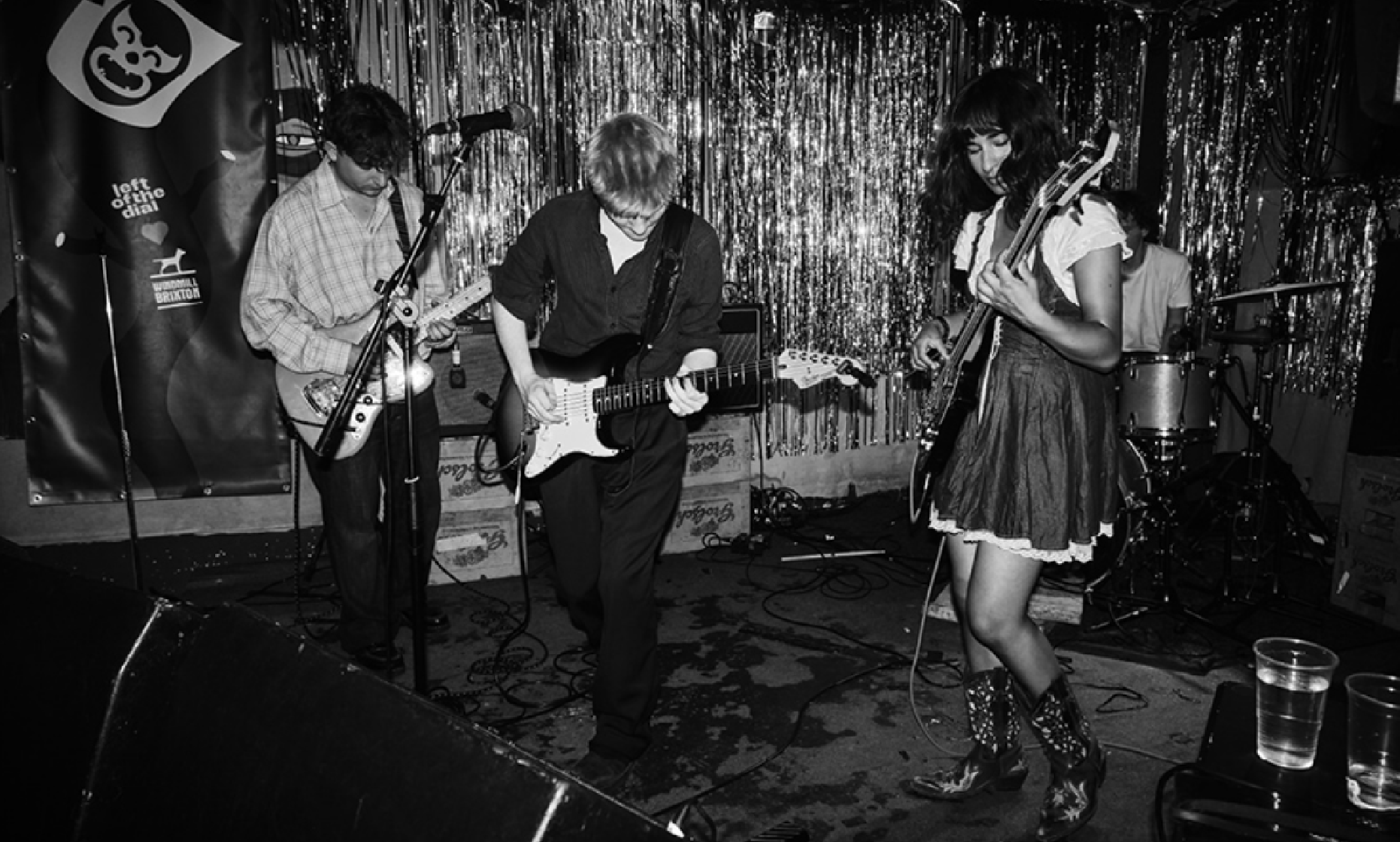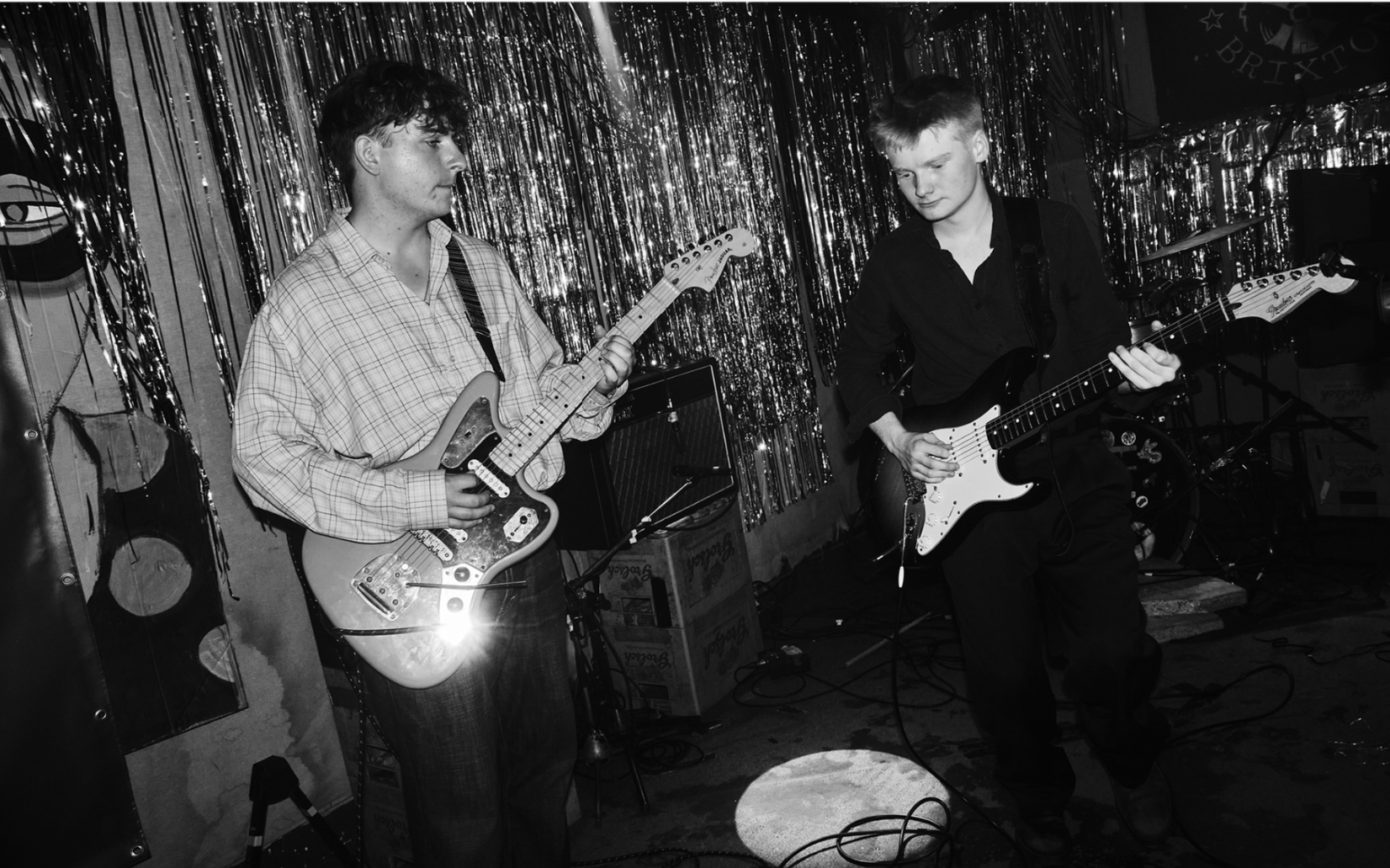CHARLEMAGNE: "it has to be 100% perfect or nothing"

Comfortably one of the most promising and interesting bands currently frequenting Brixton’s Windmill, Charlemagne are brilliantly unique: complex, dynamic, experimental. At their core is rock, but their noisy, restless sound draws from everything from noise to country. Their somewhat cryptic online presence meant there was plenty to uncover, and their intelligence and commitment to their art quickly became clear in conversation. We sat down with James (guitar/vocals), Freddie (guitar), Iman (bass), and Sean (drums) to talk everything from working with Geordie Greep and Seth Evans to the pains of perfectionism.
When and how did Charlemagne come about?
James: “We started in September 2023 when I wanted to make a new band and I know Iman from uni. I was looking for this other Freddie on Instagram, scrolling through bands I thought he might be in, when I stumbled across this Freddie instead. His profile picture was him playing guitar, and I thought, yeah, that’s good enough for me. When I eventually found the other Freddie I was originally looking for, I asked if he knew any drummers, and he said, ‘Oh yeah, I know this one guy.’ That guy said no, but told me to check out Sean – and that’s the very mundane story of how Charlemagne began.”
Your music draws from a lot of different genres and sounds – do you see Charlemagne as fitting into any particular one, or is genre just something people use to box artists in?
James: “Well, of course it started as a promotional thing – like in the ’90s, the whole reason grunge became a centralised genre was to sell stuff attached to it: here’s grunge clothing, here’s a grunge air freshener. But today you don’t really get that, because there’s so much around due to the internet and it’s harder to stuff everything into one hole.
If we were to slap a genre on us, I don’t think anything really hits the nail on the head, but I use Hyper Rock – like Hyperpop is an extrapolated, over-the-top version of pop, and I think we’re kind of that for rock. I’m into musical theatre, so maybe it’s like a natural bonding of the two.
And just to touch on something else – actually, no, I won’t say it, because I don’t want to give the game away. I hate when bands completely explain themselves. Most of the time, no one’s asking, and they’ll say, ‘Oh, we’re this, we’re this, we’re this, and if you like these bands, you’ll like us.’ You’ve got to give yourself some room to breathe – if you pigeonhole yourself too early on, which I was very close to doing, then you’re selling yourself short and denying yourself the chance to grow.”
Was there a moment when Charlemagne stopped feeling like just another hobby and started to feel like a real project?
James: “I think it was when we got a regular spot here at the Windmill. When Tim (Perry) started putting us on frequently, we were like, huh, we might be doing something right.”
Iman: “Maybe Left of the Dial as well? We kind of just felt like we were being recognised a bit – at least liked by Minke, the woman who runs it.”
James: “Even from the first rehearsal, it felt like, oh, you know what, this is actually pretty good. It didn’t feel arbitrary, it all just flowed. To be honest, it went completely against my expectations. I thought I’d go in, we’d play through a song or two, but then everyone started playing completely differently to how I expected. I just thought, okay, this is pretty good.”
You’re playing something like your 30th show at the Windmill tonight…
Iman: ”Shit! No! Oh my God.”
James: “I’ll take your word for it, sounds right. What was the question?”
Do you remember much about the first time you played?
James: Oh hell yeah. It was the New Music Monday thing that Tim puts on. Just walking in here immediately, it was like, okay, we’re, you know, we’re doing something good. Because you of course have to remember that the Windmill has a huge reputation, and It’s been a considerable amount of time since it gained this reputation. I think it was a really good gig.
Iman: Yeah we were like four hours early as well. You’ve (Sean) got to tell him what you said to Tim the first time you met him.
Sean: I told him I couldn’t sleep the night before and that it was like Christmas.
Iman: And Tim didn’t say anything to him, he just looked at him. And we were like, oh shit, that’s it we’re never playing again.

Does Tim ever give you any advice?
James: “Maybe not verbal, but you can sort of tell sometimes when… I don’t know. It’s never really about the music, I think it’s just more about how we conduct ourselves. But Tim’s been very nice to us – probably because we’ve made it so that we’re always available and we of course always want to play.”
Iman: “Whenever he asks us to play, we’ll always do it. For the Geordie (Greep) gig, I was in the middle of my 12-hour law exam and I got a text saying we’re playing with Geordie tonight, and I had to run home from the exam and get to work early.”
James: “The one tangible bit of advice Tim gave us was to change our name. A lot of people didn’t, and still don’t, like it. But I don’t care. If you’re going to be put off by the name of a band, then you’re probably not going to enjoy our music anyway, you know.”
What is it that makes you and everyone else keep coming back to the Windmill?
James: “That’s a good question. Just the general vibe here. A lot of venues around London cosplay as being a grassroots venue, when a lot of them are programmed by well-established people – not that being a well-run company is bad, but it’s not really grassroots if you’re backed by whatever.
It’s just laid back here, but not laid back to the point of incompetence – it’s a venue for playing music, full stop. If you’re here to just doss around and not for the music, then it’s not the venue for you. You tend to get people like that at other venues.”
Plenty of guitar bands end up being compared to Black Midi, but in your case there’s a direct link through supporting their solo work here. Do you take much influence from them?
James: “I don’t think so. They’re a good band, obviously, and we’ve been really lucky to work with Geordie and Seth (Evans) – they’re both incredibly intelligent. They’ve been around the block, so it’s great to learn from them. But like I was saying before, you always start out with an expectation of what you’re going to be. Of course there were certain sounds we bonded over, but as things have developed, it’s become less about that. Like any band, you grow and you find your own sound.
I mean, you look back at Black Midi videos and the comments are ridiculously full of people saying, ‘This is Frank Zappa,’ or ‘This is King Crimson,’ and it’s like – what’s the point? People love to compare, and sometimes, sure, it’s justified. But you’ve got to let bands find their footing and become something new. I think that’s what we’ve managed to do, partly thanks to Tim giving us a regular slot here – it’s given us space to grow into our own band, one that isn’t blatantly comparable.”
What was it like supporting Geordie Greep – did you get to talk much?
Iman: It was me and Sean, we were just about to walk out of the room when Geordie came over, reached out his hand and said, “You guys were great, thanks for supporting.” We had a brief chat, and then a few days later he messaged our Instagram saying, “Hey, me and Seth have this studio, let’s do some tracks.” That was really cool – it was just a fun demo session, but I think we’re meant to be doing some more serious stuff with Seth soon.
James: Yeah, Geordie and Seth have been doing it a lot longer than we have and know so much more, so it’s great to work with them. I think you sometimes expect bands like that to have a really intense, rigid work ethic, but they were just relaxed and enjoying it. But I can never chill out, I’m such a perfectionist it’s absolute pain. It has to be 100% perfect or nothing.
There are a lot of niche cultural references across your music, especially in tracks like ‘Stetson’ and ‘Sepoy’. Where does all that random imagery come from?
James: “I do History and Politics at Queen Mary’s, and Sepoy came from that because I’m doing a module on Britain from 1750 to 1900 and we had this one case study on the Sepoy mutiny of 1857, and I thought this could be a good song. And then Stetson, I was reading Bram Stoker’s Dracula at the same time and I was listening to Ennio Morricone – I’d already written the riff and the music, and then I thought, oh yeah, nice – Stetson hat, they’re cool. A lot of the time, I come up with words first, and think about the meaning afterwards. If it’s got a meaning, cool. If not, it’s up to other people to interpret however they want.”
Obviously, neither of those tracks are released yet. Do you have plans to put music out anytime soon, or is the focus still on playing live?
James: “I think we all have slightly different opinions on it. I want everything to be perfect. I’ve got a bit of a critique of bands that self-release — unless you’re making short, grabby songs that might blow up, I think labels still hold the power. I’m wary of putting something out without backing and having it go nowhere. That said, we’ve been recording with Seth and Eddie, and it does sound releasable.”
Iman: “I think the three of us are eager to sort something out. It would be good to make it happen, and I don’t think it would take long with what we have to release some tracks.”
James: “We’re all excited. I think we’ll release something when it’s ready. It’s getting there, but we’re all perfectionists and we won’t be comfortable putting out something we’re not 100% sure of. I want it to be something I would actually listen to.
Does it make me feel something? That’s the goal. I don’t care if people hate it or love it, but I would hate it if someone left a gig thinking, ‘That was alright.’ I’d rather some people walk away thinking, ‘That was the worst thing I’ve ever seen,’ and others thinking, ‘That was one of the best things I’ve ever seen.’ There’s no point in musical indifference – you should aspire to make people viscerally feel something.”
Where do you see Charlemagne in a year’s time? What would you like to have achieved?
Iman: “Minted. Some sort of release and a record deal. Festivals too.”
James: “A million babes, a million pounds. And a solid gold topped cane made from our melted Grammys. And that is the final line.”
Words: Donovan Livesey Photo: Danny Blanks

